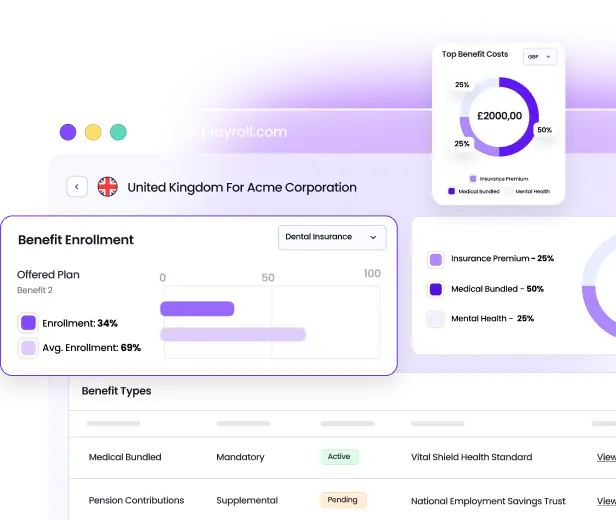Who Is Entitled to Employee Benefits In Ghana?
In Ghana, employee benefits are generally tied to the employment relationship and regulated under national labor laws. Most statutory benefits apply to all employees working under a formal employment contract, regardless of industry. Full-time employees are typically entitled to the full range of mandatory benefits, while part-time or casual workers may receive benefits on a proportional basis, depending on the nature of their work and duration of engagement.
Ghana’s Labour Act outlines clear requirements for minimum employment standards, including paid leave, social security contributions, and safe working conditions. As long as an individual qualifies as an employee, they are protected under these laws. Independent contractors, however, are not entitled to statutory employee benefits unless specifically included in their contract.
Overview of Employee Benefits In Ghana
Employee benefits in Ghana play an important role in workplace culture, helping employers meet legal obligations and demonstrate their commitment to the well-being of their teams. Compared to other markets in Africa, Ghana’s framework sits somewhere in the middle — comprehensive enough to provide protection, but flexible enough for employers to offer additional perks that make them competitive.
Ghanaian employers often supplement mandatory benefits with wellness, financial, and lifestyle perks to attract and retain talent. Benefits such as private health insurance, transportation support, and professional development have become increasingly common.
Mandatory Employee Benefits In Ghana
Mandatory benefits are legally required and form the core of any employee benefits package in Ghana. Here’s a comprehensive list of mandatory benefits in Ghana:
Social Security and National Insurance Trust (SSNIT) Contributions
Ghana requires both employers and employees to contribute to SSNIT, which provides retirement, disability, survivor, and invalidity benefits. Employers contribute 13% of an employee’s basic salary, while employees contribute 5.5%. These contributions are regulated under the National Pensions Act and must be submitted monthly along with payroll documentation.
Paid Annual Leave
Employees in Ghana are entitled to a minimum of 15 working days of paid annual leave after 12 months of continuous service. Leave must be mutually agreed upon and documented. Employers are expected to maintain accurate records to ensure compliance and employee wellness.
Maternity Leave
Female employees receive 12 weeks of paid maternity leave, extendable by two weeks for complications. Full salary is required during this time, and employers may request a medical certificate to confirm eligibility. This benefit supports maternal health and workplace inclusion.
Paternity Leave (Employer Discretion)
Though not required by law, many employers in Ghana offer 5–10 days of paternity leave. It’s typically part of internal policy, promoting gender equity and a supportive work culture for fathers.
Public Holidays and Sick Leave
Employees are entitled to paid public holidays and sick leave, with medical certification required for extended absences. These provisions ensure recovery time and uphold health and safety in the workplace.
Supplemental Employee Benefits In Ghana
Supplemental benefits are not required by law, but can help you stand out as an employer and attract top talent. They include:
Private Health Insurance
To enhance access beyond the National Health Insurance Scheme (NHIS), employers often provide private health insurance covering specialist services and faster care. Group policies are common and reduce out-of-pocket costs for employees.
Life and Accident Insurance
This benefit provides financial protection to employees’ families in the event of death or disability. It’s typically arranged with insurers and offers peace of mind, strengthening the employer brand.
Transport Allowances
To ease commuting, especially in urban centers like Accra, transport allowances or shuttle services are provided. These perks help reduce lateness and support employee punctuality and wellness.
Housing Allowances
Some companies offer housing support to senior or relocating staff. This may include rent stipends or housing arrangements, often detailed in employment contracts.
Professional Development Benefits
Employers may provide budgets for certifications, courses, or workshops. This boosts employee engagement, career progression, and retention, especially in Ghana’s growing professional sectors.
Tax Implications of Employee Benefits in Ghana
Employee benefits in Ghana are subject to tax rules outlined by the Ghana Revenue Authority (GRA). Key points include:
- Cash allowances (e.g. housing, transport) are typically taxable as part of income.
- Employer contributions to SSNIT are tax-deductible expenses.
- Medical insurance premiums paid by employers are often tax-exempt.
Employers should keep complete documentation — including benefit statements, payroll records, and receipts — to ensure tax compliance and make use of possible deductions or exemptions.
Legal Considerations for Employee Benefits in Ghana
Employee benefits in Ghana are regulated by the Labour Act, the National Pensions Act, and GRA tax guidelines. These frameworks define entitlements, employer responsibilities, and compliance obligations. Violating these regulations can result in fines, penalties, or lawsuits.
Regular audits of benefit policies, payroll processes, and employment contracts help ensure compliance. Employers must also remain informed about legislative updates, especially those related to pensions and tax treatment of benefits.
By staying proactive and aligned with national laws, companies reduce legal risk and maintain a competitive edge in talent management.
How Benefits Impact Employee Cost
Employee benefits contribute significantly to total labor costs. Contributions to SSNIT, leave payments, and supplemental allowances must be factored into payroll planning. However, benefits also drive retention, satisfaction, and productivity — offsetting some of the upfront expense.
Employers can manage costs by:
- Offering tiered benefit packages based on role or tenure
- Negotiating group rates for insurance policies
- Structuring allowances in tax-efficient ways
Disclaimer
THIS CONTENT IS FOR INFORMATIONAL PURPOSES ONLY AND DOES NOT CONSTITUTE LEGAL OR TAX ADVICE. You should always consult with and rely on your own legal and/or tax advisor(s). Playroll does not provide legal or tax advice. The information is general and not tailored to a specific company or workforce and does not reflect Playroll’s product delivery in any given jurisdiction. Playroll makes no representations or warranties concerning the accuracy, completeness, or timeliness of this information and shall have no liability arising out of or in connection with it, including any loss caused by use of, or reliance on, the information.
.svg)
.svg)
.svg)





.svg)



.png)












.webp)









.svg)